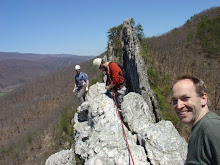 Lu Yuan, a teacher of mine, once quoted, "The mountains are high and the emperor is far away;" of its origin I am unsure, yet the quote, in its simplicity, encompasses the complexity with which we must learn to understand Yunnan, or even China, itself.
Lu Yuan, a teacher of mine, once quoted, "The mountains are high and the emperor is far away;" of its origin I am unsure, yet the quote, in its simplicity, encompasses the complexity with which we must learn to understand Yunnan, or even China, itself.I am, so far, unable to describe the feelings I have had. Driving to Tonghai from Kunming one is not oblivious in any way to the apparent poverty and tradition, clashing and composing with the modern, industrial, and highly technical new China. Is it a matter of change, or of cultural preservation?
The rape seed lined the highway with its delicate yellow blossom, stopped by the occasional dyke or a cluster of bricks and squaller which cannot be avoided. Yet, amongst these shacks, these homes, lives religion, and life.
One cannot avoid it. An eighteenth century Confucian temple was one of our last stops in Tonghai, this supporting beams one of the last things we were shown. Amidst the hustle of the men and women smoking and playing games, amidst the children running and shouting, sat this pillar. This supporting pillar, built some three hundred years ago, bares the marks of a people. Now faded, these characters scream of a free China, unsuppressed by war. These marks, painted during the Sino-Japanese War, claim death to the Japanese, and victory for the Chinese.
It is hard to know what to think, what is right, and what it all means. Kong Fuzi was a philosopher and a great politician. I am not sure if there exists any material culture which might separate Confucian followers from others, yet this temple seemed to serve as a social place for the elderly community.
Here, China existed. The remnants of a former communist union, controlled and regulated by the state were strewn throughout Tonghai and, later, Hexi Village.



No comments:
Post a Comment